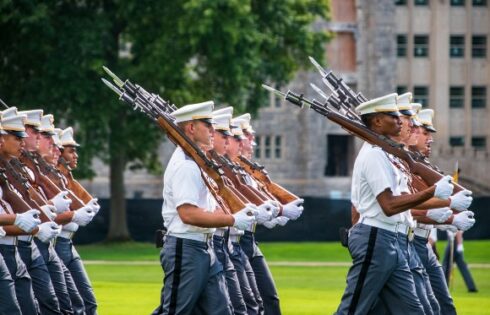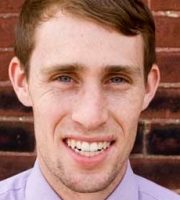
Few active conservatives awarded Truman scholarships
In once discussing the federal Truman Scholarship program, former Secretary of State Madeleine Albright said she could “easily see tomorrow’s Cabinet members, elected representatives, nonprofit directors — even presidents” in those awarded the scholarships.
But if a survey looking at the previous two years’ awardees is any indication, those future leaders will likely be Democrats.
Data compiled by The College Fix shows 2015 and 2016 Truman scholars who have been involved in political advocacy overwhelmingly have worked with Democrat groups or liberal organizations. The analysis comes amid the recent of announcement of the 2017 Truman Scholars.
Scholarships are awarded to college juniors, who receive $30,000 to put toward graduate school and are required to serve three of their first seven years after graduate school in public service.
About 35 percent involved in liberal work
More than 40 of the 112 scholars in 2015 and 2016 have ties to Democratic politicians or liberal groups while less than a handful were found to have worked for Republicans or conservative organizations.
Among the 2015 Truman Scholars, at least 26 had either worked for Democratic politicians and administrations, liberal leaning organizations or were members of the College Democrats before or after they were awarded the Truman Scholarship. The Fix identified only two scholars as having ties to Republicans or conservative groups on their resumes.
Multiple scholars interned for local and Congressional Democratic lawmakers, as well as at the White House during President Barack Obama’s tenure. Scholar Frank Smith was a fellow for Hillary Clinton’s 2016 presidential campaign. Another, Katherine Hamilton, worked on Obama’s 2012 reelection campaign. Others worked for liberal-leaning think tanks and advocacy groups such as the Brookings Institute, Planned Parenthood, Feminist Majority Foundation, NAACP and Urban Institute.
Of the two students with conservative credentials, scholar John Addison interned at the right-of-center American Enterprise Institute and Daniel Waqar worked for the conservative group Americans for Prosperity.
The disparity among 2016 scholars was smaller, but still present.
The Fix’s analysis found at least 16 scholars worked for Democratic politicians or left-leaning groups but only two students who worked for Republicans.
Of those 16 left-leaning recipients, more than a handful worked for Democratic politicians. A few also held internships in the Obama White House.
Like with the 2015 scholars, only two in 2016 were found to have ties to conservative political work: one interned for U.S. Sen. Jeff Flake of Arizona and the other at a local District Attorney’s office.
Based solely on scholars’ biographies and LinkedIn resumes, it’s possible data compiled by The Fix doesn’t account for all 2015 and 2016 scholars who have been involved in political work.
Liberal professors to blame?
When asked about The Fix’s finding, a leader with the Harry S. Truman Scholarship Foundation said he disagrees that the Truman foundation has any liberal bias.
Andrew Rich, the foundation’s executive director, said scholarships are awarded on service and leadership, not political advocacy. He said a large number of recipients are not involved in political work, and the selection committee works to tap awardees from across a wide spectrum geographically and ideologically.
“We’re really focused on what they’ve done by way of service and then their engagement with leadership around it. It’s fairly infrequent that it’s political,” Rich said in a February phone interview. “Most [scholars] aren’t very political at all.”
However, a webpage on the foundation’s website titled “Are You a Potential Truman Scholar?” lists “Partisan political activities and campaigns” as one of multiple qualifications when it comes to having a strong community service record when applying for the scholarship.
To apply, students first go through their university, which forwards up to four applicants to the Truman Foundation. Rich noted universities usually have internal processes in deciding who to nominate to the Truman Foundation. Campuses have a faculty representative to the scholarship program, and the nature of who holds that position varies by campus.
When discussing possible bias in who’s awarded the scholarship, Rich put the onus back on the universities: “It’s a reflection of the kind of applicants we’re being sent from the universities.”
“In all honesty, I mean, we do see both intellectual and ideological variety among our applicant pool. To the extent that there’s less … one direction or another, it really has to do with the schools are sending our direction,” he said.
The possibility of left-leaning professors influencing the ideologically make up of Truman nominees holds merit, given the well-established liberalism of university professors; survey after survey finds professors overwhelmingly are registered Democrat and give to Democrat causes and politicians.
Bipartisan by law, but not in action
As for the foundation, it uses a committee to evaluate the nominated students and selects roughly 200 finalists to be interviewed at 16 regional sites. Around 50 to 60 scholars are selected from the 200 finalists. In 2015 and 2016, 58 and 54 scholars were awarded.
Operating as an independent, executive branch agency, the Truman Scholarship Foundation was established by Congress as a federal memorial to President Harry Truman. The foundation’s board of trustees has a bipartisan makeup, as directed by federal statute.
The first scholarships were awarded in 1977-1978 and some 3,000 have been awarded in total. In the last four decades, it has become one of America’s most competitive scholarship programs with multiple recipients going on to become Rhodes Scholars.
Emails to the offices of U.S. Sen. Roy Blunt and U.S. Rep. Charlie Dent, both Republican members of the foundation’s board, seeking comment on scholarship data went unanswered. Efforts to seek comment from the U.S. Department of Education also were unsuccessful.
While the data compiled by The College Fix shows a high number of liberally minded students awarded scholarships, the Truman Scholarship isn’t without famous conservative alumni. Notables include Supreme Court Justice Neil Gorsuch, Missouri Gov. Eric Greitens and Kentucky Agriculture Commissioner Ryan Quarles, the youngest statewide elected official nationwide.
However, it was prominent Democratic scholars who highlighted the foundation’s 40th anniversary events held last year in New York City and Washington, D.C. New York City Mayor Bill De Blasio hosted the celebration in his city and a panel included in the anniversary events of “distinguished” scholarship alumni included only Democratic political figures.
MORE: Democrats outnumber Republicans nearly 12 to 1 in the social sciences
Like The College Fix on Facebook / Follow us on Twitter
IMAGE: Odua Images/Shutterstock






Please join the conversation about our stories on Facebook, Twitter, Instagram, Reddit, MeWe, Rumble, Gab, Minds and Gettr.